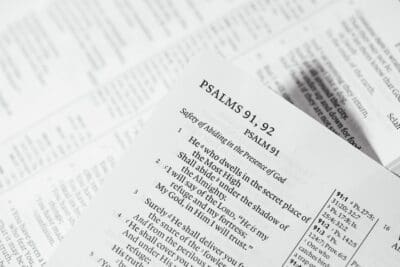If you’re stressed out, raise your hand.
My hand is raised, and I know I’m not alone. Millions of Americans—Christians included—would say the same. I often don’t know stress is affecting me; I’m usually fine one moment, and crying the next. And as much as I want to blame stress, making myself a victim of its pressures, I know I need to take a deeper look at my heart.
What’s at the root of our stress, beneath the circumstances that seem to cause it? And how does God’s Word speak to our struggle with it?
Moses’ Heavy Burden
Moses found himself in a difficult position after the Exodus. God had delivered the Israelites from slavery in Egypt, bringing them miraculously through the Red Sea and into freedom. Moses and the people had beheld God’s great glory and power in the destruction of their enemies and the provision of divine rescue. They saw him do what they could never do for themselves.
After crossing the waters, the people continued to see God provide, as he sent manna to nourish their hungry bodies and water from a rock to quench their thirst. God also provided wisdom and justice for the Israelites through Moses, who would “judge the people…from morning till evening” (Exodus 18:13). But there was a problem—
When Moses’ father-in-law [Jethro] saw all that he was doing for the people, he said, “What is this that you are doing for the people? Why do you sit alone, and all the people stand around you from morning till evening?” (v. 14)
Jethro was concerned for Moses, and rightfully so. The Bible doesn’t tell us that Moses was “stressed out,” per se, but there were either indications of this, or Jethro had the foresight to see the coming effects of what Moses was doing.
Moses’ father-in-law said to him, “What you are doing is not good. You and the people with you will certainly wear yourselves out, for the thing is too heavy for you. You are not able to do it alone.” (vv. 17-18)
Wearing Ourselves Out
Do you resonate with this account? Perhaps your intentions are good, but you’re wearing yourself out because you’ve taken on too much and not asked for help. Or perhaps you’re obeying God by simply doing what he’s asked of you, but circumstances have become heavy with tension, complications, or hardship.
Like Moses, we’ve seen God’s great works throughout biblical history; more than Moses, we’ve beheld God’s greatest work in delivering us from sin and death through Christ. Yet, like Moses, we may be carrying heavy burdens, unable “to do it alone.”
Jethro’s response to Moses reveals three important truths about stress that we should take to heart:
Stress invites us to examine ourselves and our circumstances. “What you are doing is not good,” he said. By “not good,” Jethro isn’t saying that what Moses is doing is bad, but that there’s a more sustainable way to do it. Though our actions are honoring to God, stress might tell us that the means by which we act may need to be reevaluated.
Stress has reverberating effects. Then Jethro says, “You and the people with you will certainly wear yourselves out.” Stress not only affects you and me, but the people around us. A work process begins to fall apart; family interactions suffer; our spouse receives the worst of us. Stress isn’t held in a vacuum.
Stress points to a self-sufficient attitude. “The thing is too heavy for you. You are not able to do it alone.” A buildup of stress can come from a desire for control. We act independent of God and others because admitting our need for help exposes our weakness, and we don’t like to feel weak. We’d rather be stressed while trying to defy our limits than recognize them in humility.
Jethro’s Solution
Jethro doesn’t stop with diagnosing Moses’ problem. Instead, he offers a wise solution:
…look for able men from all the people, men who fear God, who are trustworthy and hate a bribe…And let them judge the people at all times. Every great matter they shall bring to you, but any small matter they shall decide themselves. So it will be easier for you, and they will bear the burden with you. (vv. 21-22)
Jethro offers Moses a game-plan for addressing the people’s needs while upholding his role as judge. More important than this, Jethro’s plan addresses the root of his son-in-law’s heavy burden by offering good news for his weariness: “If you do this, God will direct you, you will be able to endure, and all this people also will go to their place in peace” (v. 23).
Stressed brother or sister, take God’s Word to heart today:
Good News for Stressed People
“God will direct you.” You are not in control. The weight of the world doesn’t fall on you. God alone reigns and rules over all things, and everything belongs to him. Stress results when we pridefully try to handle circumstances in our own strength, or direct our course with a certain outcome in mind. But Jesus’ lordship has freed us from this trap; we can trust God to provide for our days because we’ve seen his provision for our souls through Jesus Christ.
“You will be able to endure.” Stress lies to us that we’re on our own—but no one is able to endure this way for long. Scripture tells us the truth: Through Christ’s strength, we can do what God calls us to do, and because of Christ’s sufficiency, we can stop at the end of the day and rest. Trusting in both Jesus’ strength and sufficiency will give us the power to persevere and the peace to pause.
“All this people also will go to their place in peace.” What’s the result of trusting Christ’s lordship and enduring in his strength? Peace. And not only for us, but for those around us. When we are convinced that Jesus reigns as Lord on the throne of the universe and our lives, that nothing escapes or surprises him, and that he’ll guide and strengthen our way, the fruit of such trust is his peace.
Stress may threaten to wear us out and steal our peace, but we know we “are not able to do it alone.” We can rest that we aren’t in control, and that we worship and serve a living Savior and risen Lord who is.
What a relief!








